MercoPress. South Atlantic News Agency
Tag: Central Bank of Argentina
-
Tuesday, January 18th 2022 - 09:59 UTC
Argentine FM in Washington DC seeking support for new IMF deal

Argentine Foreign Minister Santiago Cafiero is on a diplomatic mission to Washington DC where he is to hold meetings with US Secretary of State Anthony Blinken and with House Speaker Nancy Pelosi in a move aimed at gathering some support ahead of new negotiations with the International Monetary Fund (IMF).
-
Tuesday, January 4th 2022 - 17:57 UTC
Foreign trade yield US $ 15 billion to Argentina's Central Bank in 2021

Foreign trade has meant around US $ 15 billion for Argentina's Central Bank (BCRA) in 2021, according to projections reported Monday in Buenos Aires. It became the fifth best surplus so far in the 21st century, despite November's US $ 117 million deficit, the first setback since 2018.
-
Saturday, November 27th 2021 - 09:45 UTC
No installments in Argentine pesos for purchases in foreign currency

Argentina's Central Bank (BCRA) Thursday ruled that international travel tickets and other tourism items purchased through credit cards and whose values are expressed in US dollars or any other foreign currency but converted to Argentine pesos on the date of the operation cannot be split into monthly payments.
-
Monday, November 22nd 2021 - 09:58 UTC
Fears of devaluation loom over Argentina as Central Bank reserves run almost dry

Argentine Economy Minister desperately needs to reach an agreement with the International Monetary Fund (IMF) this week, because the Central Bank (BCRA) has only US $ 800 million left in cash with which to intervene in the local exchange market, which is pressing for a devaluation.
-
Friday, November 5th 2021 - 09:29 UTC
Argentine Central Bank takes action to keep exchange rate under control
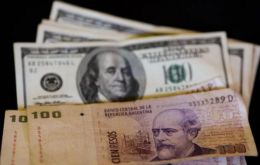
Argentina's Central Bank (BCRA) Thursday ordered banking institutions nationwide not to increase their holdings in foreign currency until the end of the month, amid a market pressure on the exchange rate.
-
Friday, October 29th 2021 - 09:00 UTC
Argentine Central Bank wants tourists to exchange money through formal channels
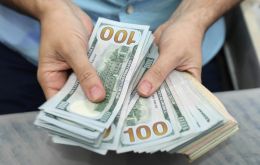
As borders are about to reopen and tourists are expected to pour in, Argentine authorities have devised a mechanism whereby foreigners may exchange currency (US dollars) at a rate closer to the unofficial (“blue”) one.
-
Saturday, October 16th 2021 - 09:15 UTC
Argentina has become a Chinese Yuan testing ground in trade and investment
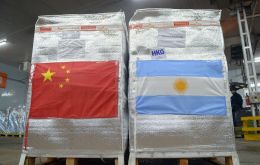
Following several currency swaps by which China has helped to support the Argentine central bank depleted international reserves, the administration of president Alberto Fernandez intensified relations with Beijing and a year ago allowed transactions between the two countries to be made in Yuan.
-
Wednesday, April 14th 2021 - 09:42 UTC
Argentine Vice-President and aides acquitted in Central Bank “future dollar” case
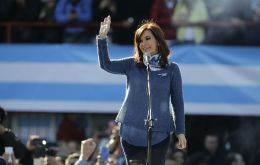
Argentina's top penal court of appeals Tuesday acquitted former President Cristina Fernández de Kirchner (2008-2015) and her aide Axel Kiciloff of all charges in the so-called future dollar case, because there had been no damage to the State, and that economic policy issues are not subject to prosecution.
-
Friday, August 7th 2020 - 08:31 UTC
Argentina and China renew US$ 18 billion swap; Beijing will pay for agriculture imports in Yuan
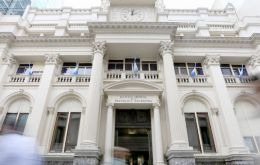
The central bank of Argentina announced it will renew a currency cooperation agreement with the People's Bank of China to swap US$ 18.2 billion worth of each other's currencies next week, El Economista reported on Friday.
-
Monday, September 9th 2019 - 09:57 UTC
Another week of uncertainties begins in Argentine markets
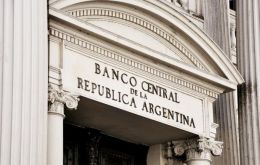
Another volatile week with still many uncertainties begins this Monday for Argentina even when some of the latest measures adopted by the administration of President Mauricio Macri helped to calm markets, debilitating apocalyptic forecasts.
